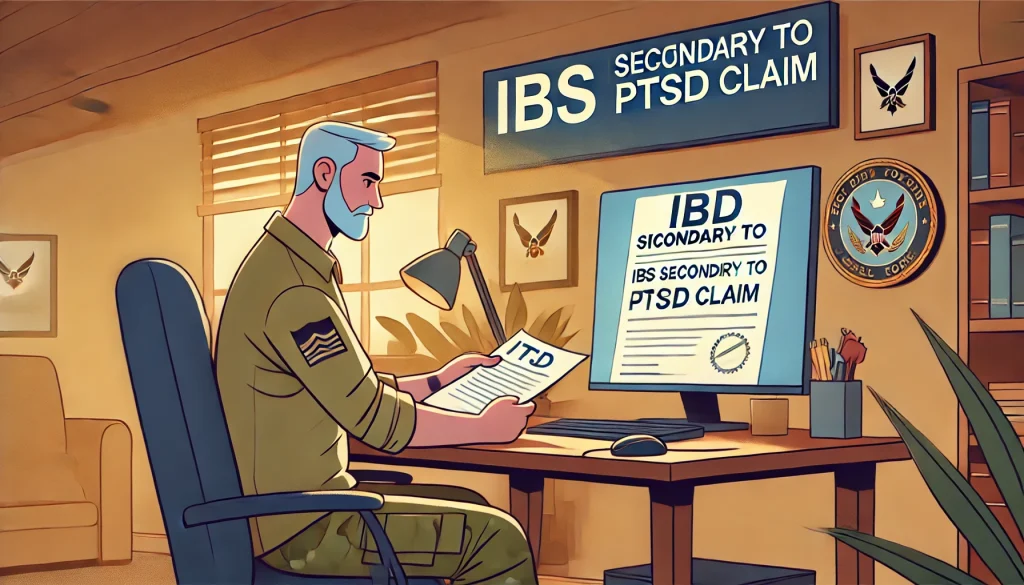Veterans often experience both physical and mental health issues related to their military service. One surprising but increasingly recognized connection is between Post-Traumatic Stress Disorder (PTSD) and Irritable Bowel Syndrome (IBS).
Studies have shown that PTSD can aggravate or even cause IBS symptoms, leading to gastrointestinal distress in individuals suffering from mental health challenges. In this article, we’ll explore the relationship between IBS and PTSD, how veterans can file a claim for IBS secondary to PTSD, and the VA rating criteria for this condition.
Can PTSD Cause IBS?
Research indicates that there is a significant correlation between PTSD and the onset of IBS. PTSD, a mental health disorder triggered by experiencing or witnessing traumatic events, often leads to chronic stress. This prolonged stress can affect the gut-brain axis, the communication network between the digestive system and the brain. The gut is sensitive to emotional and psychological states, and chronic stress caused by PTSD can lead to digestive issues, including IBS.
According to a study published by the Journal of Clinical Gastroenterology, gastrointestinal symptoms, including IBS, are more common among veterans with PTSD than those without. The constant psychological strain of PTSD can lead to gastrointestinal problems like abdominal pain, bloating, diarrhea, and constipation, all hallmark symptoms of IBS.
For more on the prevalence of IBS among veterans with PTSD, you can read the study here: Prevalence of GI Symptoms and IBS Among Veterans with PTSD.
AI Powered Chatbot for VA Disability Claims
Learn more about the VA Disability process and get help with our VA Disability Claim Chatbot programmed and trained by AI

.
How IBS Develops Secondary to PTSD
IBS secondary to PTSD is classified as a secondary service-connected condition by the VA. A secondary condition is one that develops as a result of a service-connected primary condition. In this case, PTSD is the primary condition, and IBS is the secondary condition that arises due to the physical impact of stress and anxiety on the gastrointestinal system.
Some of the key factors that link IBS and PTSD include:
- Chronic Stress: PTSD causes prolonged stress, which can lead to an overactive gut and irregular bowel movements.
- Fight or Flight Response: PTSD triggers the fight-or-flight response, increasing levels of cortisol and adrenaline, which can negatively affect digestion.
- Hypervigilance: Veterans with PTSD may experience constant anxiety, which can cause changes in gut motility and result in IBS symptoms.
To learn more about how stress and trauma can lead to IBS, visit the IBS Network’s factsheet: Stress, Trauma, and IBS.
VA Rating for IBS Secondary to PTSD
Veterans can file a VA claim for IBS secondary to PTSD. When the VA evaluates claims for IBS as a secondary condition, they look at the severity of both the primary condition (PTSD) and the secondary condition (IBS). The VA rating for IBS secondary to PTSD typically falls between 0% and 30%, depending on the severity of the symptoms.
Here’s a general breakdown of how the VA rates IBS:
- 0% Rating: Mild symptoms with little to no impact on daily life.
- 10% Rating: Moderate symptoms, including frequent episodes of abdominal distress and irregular bowel movements.
- 30% Rating: Severe symptoms, including constant abdominal distress, frequent diarrhea, and alternating diarrhea and constipation.
To receive a higher VA rating, veterans must provide evidence that their IBS significantly affects their daily life. For more on how the VA rates IBS, visit VA’s Rating Guide for IBS.

How to Prove IBS Secondary to PTSD
To successfully file a claim for IBS secondary to PTSD, veterans must provide evidence that links their IBS to their service-connected PTSD. Here are the steps to strengthen your claim:
- Get a Diagnosis of Both Conditions: Ensure that you have an official diagnosis of PTSD from a healthcare provider and a diagnosis of IBS from a gastroenterologist.
- Provide Medical Evidence: Medical records should show that IBS developed after your PTSD diagnosis and that your gastrointestinal symptoms are linked to the mental health condition.
- Submit a Nexus Letter: A nexus letter from your doctor can help connect your IBS to your PTSD, explaining how the mental health condition led to the development of the gastrointestinal disorder.
- Document Symptoms: Keep a record of your IBS symptoms, noting how frequently you experience abdominal pain, diarrhea, constipation, and bloating. This documentation will help the VA assess the severity of your condition.
For a more in-depth look at the connection between GI symptoms and PTSD, check out the US Medicine article: GI Symptoms and IBS Among Veterans with PTSD.
